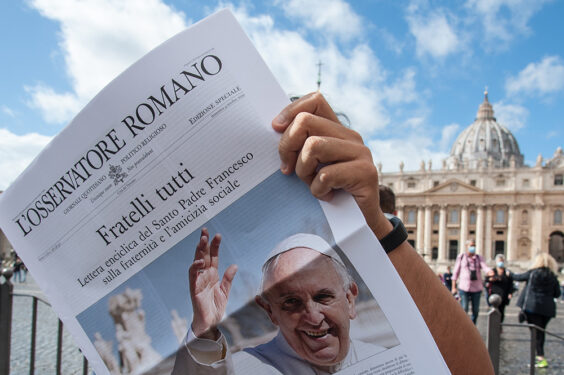
The following is a powerful statement about the pandemic from Pope Francis’ recent encyclical, “Fratelli Tutti”:
“We gorged ourselves on networking and lost the taste of fraternity. We looked for quick and safe results, only to find ourselves overwhelmed by impatience and anxiety. Prisoners of virtual reality, we lost the taste and flavor of ‘the truly real’. The pain, uncertainty and fear, and the realization of our own limitations, brought on by the pandemic have only made it all the more urgent that we rethink our styles of life, our relationships, the organization of our societies, and, above all, the meaning of our existence.” (p.22)
For me, and I imagine for everybody, the experience of the pandemic has been difficult. What I draw from Pope Francis’s encyclical and his new book “Let Us Dream Together; the Path to a Better Future” is the need to enter more deeply into myself and enter more deeply into my relationship with God and others. The pandemic, along with the pope’s insights, has helped me to see more clearly what is most important in my life. It has especially helped me cherish and be grateful for many blessings in my life, blessings that I did not sufficiently appreciate in the past.
I want my post-pandemic experience to be better than my pre-pandemic experience. During the pandemic, many of us have had the time for reflection and prayer, time that we may not have used so wisely before the pandemic. I hope and pray that our post-pandemic may be enriched from what we have learned during the pandemic. My experience of prayer seems to have improved during the pandemic. I think I am more aware of how dependent we are on God and that God is infinitely faithful. I hope that is the experience of many.
I wonder how much my enthusiasm for Pope Francis’ writing is because much of what he writes about the human person is similar to what I stress in several philosophy courses that I teach at St. John’s University. Besides agreeing with what he writes, I treasure the indirect confirmation I receive from the pope emphasizing what I emphasize in class. In addition to that, I often feel that he is directing some of his remarks directly at me. For example, in “Fratelli tutti” Pope Francis makes some comments about listening that I hope I can use to improve how I relate to students and others. He writes the following:
“The ability to sit down and listen to others, typical of interpersonal encounters, is paradigmatic of the welcoming attitude shown by those who transcend narcissism and accept others, caring for them and welcoming them into their lives. Yet today’s world is largely a deaf world…At times, the frantic pace of the modern world prevents us from listening attentively to what another person is saying. Halfway through, we interrupt him and want to contradict what he has not even finished saying.
We must not lose our ability to listen. Saint Francis heard the voice of God, he heard the voice of the poor, he heard the voice of the infirm and he heard the voice of nature. He made of them a way of life. My desire is that the seed that Saint Francis planted may grow in the hearts of many.” (paragraph 48)
I find what Pope Francis has written about listening both insightful and beautiful. What a wonderful ideal he presents to us. I believe that God is speaking, that the poor are speaking, that the infirm are speaking and that nature is speaking, but am I listening? Do I want to listen? I believe that if we do listen we will be called to act. What we are called to do may be difficult, at times extremely difficult, but I believe that listening and acting are the key to fulfillment and joy.
Deafness can destroy; listening and acting can give us a taste of God’s Kingdom. No one can do everything, but everyone can do something. There is some success even in trying. No one will be perfect, but each of us can try to listen, which itself is an act of love, and the Holy Spirit may take our feeble efforts and use them to sanctify ourselves and others.
When we try to listen, it seems inevitable that we will be surprised more often than not. When we act on what we have heard, we may surprise ourselves, doing what we never thought we could accomplish. To listen and to act is taking a risk. We don’t know where the Spirit may be leading us. Our God is a God of surprises. Recognizing our weaknesses and limitations may be an essential step toward appreciating God’s greatness and the power of God’s love.
Father Lauder is a philosophy professor at St. John’s University, Jamaica. He presents two 15-minute talks from his lecture series on the Catholic Novel, 10:30 a.m. Monday through Friday on NET-TV.
